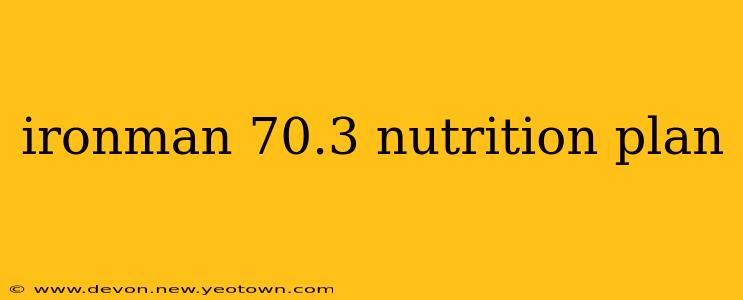The Ironman 70.3 is a grueling test of endurance, demanding meticulous preparation in every aspect, especially nutrition. This isn't just about eating enough; it's about fueling your body strategically throughout training and race day to maximize performance and minimize the risk of hitting the wall. My name is Alex, and as a certified sports nutritionist and Ironman finisher myself, I've seen firsthand the impact of a well-planned nutrition strategy. Let's dive into a plan that will help you conquer this epic challenge.
Understanding Your Energy Needs
Before we delve into specifics, understanding your individual energy needs is crucial. This isn't a one-size-fits-all approach. Factors like your weight, metabolism, training intensity, and even genetics influence how much fuel you need. Consulting a registered dietitian or sports nutritionist is highly recommended for personalized guidance.
However, generally, Ironman 70.3 athletes require a higher caloric intake than the average person. This increased energy demand is necessary to support the intense physical stress of training and racing.
Macronutrient Breakdown: The Foundation of Your Plan
Your nutrition plan should revolve around a balanced intake of macronutrients: carbohydrates, proteins, and fats.
-
Carbohydrates: These are your primary energy source, especially during endurance events. Aim for a high intake of complex carbohydrates like whole grains, fruits, vegetables, and legumes. These provide sustained energy release, preventing energy crashes. Simple carbs, like fruits, can be beneficial for quick energy replenishment during workouts.
-
Protein: Essential for muscle repair and growth, especially crucial after intense training sessions. Include lean protein sources such as chicken, fish, beans, lentils, and tofu in your daily diet. Aim for adequate protein intake to support recovery and prevent muscle breakdown.
-
Fats: Don't neglect healthy fats! They're vital for hormone production, nutrient absorption, and sustained energy. Include sources like avocados, nuts, seeds, and olive oil.
Race Day Nutrition: A Step-by-Step Guide
Race day nutrition is critical. Poor fueling can lead to disastrous results. Here's a breakdown of what you should consume leading up to and during the race:
Pre-Race (Days Before):
Focus on carbohydrate loading to maximize glycogen stores in your muscles and liver. This doesn't mean gorging on junk food; rather, it involves gradually increasing your carbohydrate intake in the days leading up to the race while maintaining adequate protein and healthy fats.
Pre-Race (Morning Of):
Consume a light, easily digestible breakfast 2-3 hours before the race. This should be primarily carbohydrates with a small amount of protein. Think oatmeal with berries, toast with banana, or a rice cake with peanut butter. Avoid anything new or likely to cause digestive upset.
During the Race:
This is where a well-practiced fueling strategy is vital. Consistent intake of carbohydrates and electrolytes is key to maintaining energy levels and preventing dehydration. Experiment with different options during training to find what works best for you. Popular choices include:
-
During the Swim: This is usually short enough that additional nutrition isn't strictly necessary. Focus on hydration.
-
During the Bike: Consume easily digestible carbohydrates and electrolytes every 30-45 minutes. Energy gels, chews, or sports drinks are good options.
-
During the Run: Continue consuming carbohydrates and electrolytes, perhaps switching to smaller portions or different delivery methods to avoid stomach discomfort.
Post-Race:
Replenish glycogen stores and initiate muscle repair with a high-carbohydrate, high-protein meal or shake within 30-60 minutes of finishing the race. This crucial post-race nutrition is often overlooked, hindering recovery.
Hydration: The Often-Forgotten Essential
Hydration is as critical as nutrition. Dehydration significantly impacts performance. Drink plenty of water throughout the day, especially during and after training and on race day. Consider electrolyte drinks to replace lost salts through sweat.
What Should I Eat Before an Ironman 70.3?
This is highly individualized and dependent on your digestive system tolerance and your personal preferences, but generally, you want a balanced mix of carbohydrates for energy and some protein for satiety and preventing a blood sugar crash.
What Should I Eat During an Ironman 70.3?
During the race, easily digestible carbs are key. Gels, chews, and sports drinks are popular choices, along with some readily-available whole food options that you've practiced with during training to avoid gastrointestinal upset on race day.
What Should I Eat After an Ironman 70.3?
The post-race meal is crucial for recovery. Focus on replenishing glycogen stores (carbohydrates) and repairing muscles (protein). A shake with protein powder and carbohydrates is a great option, as is a meal with lean protein and complex carbs.
How Much Should I Eat Before, During, and After an Ironman 70.3?
This varies significantly based on individual needs. Experimentation during training is key. It's best to consult a registered dietitian or certified sports nutritionist to determine the ideal quantities for your specific needs and training load.
Remember, this is a general guideline. Your specific needs will vary based on individual factors. Consult with a healthcare professional or registered dietitian to create a personalized nutrition plan that aligns with your training schedule and race goals. Good luck with your Ironman 70.3!

